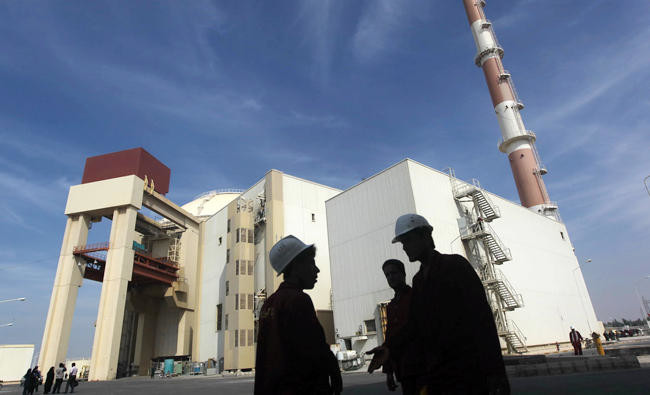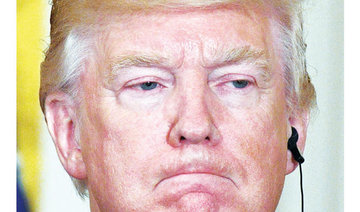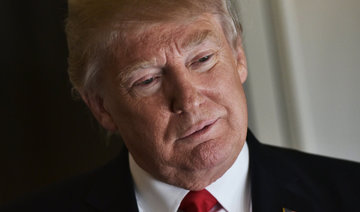WASHINGTON: US President Donald Trump finds himself under immense pressure as he considers de-certifying the international nuclear deal with Iran, a move that would ignore warnings from inside and outside his administration that to do so would risk undermining US credibility.
Trump is expected to unveil a broad strategy on confronting Iran this week, likely on Friday. There was always the chance he could still have a last-minute change of heart and certify Iran’s compliance with the 2015 accord, which he has called an “embarrassment” and the “worst deal ever negotiated.”
Senior US officials, European allies and prominent US lawmakers have told Trump that refusing to certify the deal would leave the US isolated, concede the diplomatic high ground to Tehran, and ultimately risk the unraveling of the agreement.
Signed by the US, Britain, France, Germany, Russia, China, the EU and Iran, the deal relieved sanctions on Tehran in exchange for curbing its disputed nuclear program.
The International Atomic Energy Agency (IAEA) concluded that Iran secretly researched a nuclear warhead until 2009, which Tehran denies. Iran has always insisted that its nuclear program is for peaceful purposes and denies it has aimed to build an atomic bomb.
After Trump made clear three months ago he would not certify Iran’s compliance with the deal, his advisers moved to give him options to consider, a senior administration official said.
“They came up with a plan that protects the things they are concerned about but doesn’t recertify, which the president made clear he was not going to do. That ship has sailed,” according to the official.
The official said Trump has been telling foreign leaders and US lawmakers that his refusal to certify the Iran deal would not blow it up.
“He’s not walking away from it. The chances of him walking away from it go down if they work with him on making it better,” the official said.
White House officials said Trump is expected to announce a broad, more confrontational policy toward Iran directed at curbing its nuclear and ballistic missile programs and financial and military support for Hezbollah and other extremist groups.
Trump has said he believes the nuclear deal is too generous toward Iran and would not stop it from trying to develop a nuclear weapon.
He has criticized the agreement’s “sunset clauses,” under which some restrictions on Iran’s nuclear program would expire over time. He also wants to toughen language on ballistic missiles and inspections. The International Atomic Energy Agency says Iran is complying with the agreement.
No renegotiation
European officials have categorically ruled out renegotiating the deal, but have said they share Trump’s concerns over Iran’s destabilizing influence in the Middle East.
Several diplomats have said Europe would be ready to discuss sanctioning Iran’s ballistic missile tests and forming a strategy to curb Iran’s influence in the region.
Officials have also said there could be room to open a new negotiation for what happens once some of the core terms of the deal begin expiring in 2025, although there is no reason to believe Iran would be ready to enter in such a negotiation. Iran has said it may exit the deal if the US withdraws.
De-certifying would not withdraw the United States from the deal but it would give the US Congress 60 days to decide whether to reimpose the sanctions on Tehran that were suspended under the agreement.
One US official involved in administration said that declining to certify Iran’s compliance would probably leave all of the parties to the deal on one side and the US on the other.
“That means that while the French and others are also interested in curbing Iran’s destabilizing activities, they may be less likely to follow (the US lead at the risk of the agreement blowing up,” the official said.
British Prime Minister Theresa May and French President Emmanuel Macron both spoke to Trump this week to express their concerns about the potential decision not to recertify the Iran deal.
“If the feeling is that the United States no longer supports the agreement, then the political reality is that the agreement will be in serious jeopardy and its implementation will be very difficult,” a senior French diplomat said.
Two other US officials said Trump’s bellicose rhetoric on a number of fronts is troubling both many of his own aides and some of America’s closest allies, a few of whom have asked US officials privately if Trump’s real objective is attacking Iran’s nuclear facilities.
One of the officials said that like the heated rhetoric with North Korea on its nuclear program, the Iran discussion has vexed White House Chief of Staff John Kelly, Defense Secretary Jim Mattis and Secretary of State Rex Tillerson “who have tried to advise the President that there are significant risks in the course he’d prefer to pursue.”
“At the end of the day, though, everyone recognizes that he’s the decider.”
Trump allies who oppose the deal have watched the president closely to see if he might buckle under pressure.
“He’s not going to re-certify,” said Sebastian Gorka, a former Trump national security aide.
“I’m not worried. His gut instinct is absolutely right.”
Trump resists pressure to soften stance on Iran nuclear deal
Trump resists pressure to soften stance on Iran nuclear deal

Pakistan test fires ballistic missile as tensions with India spike after Kashmir gun massacre

ISLAMABAD: Pakistan test-fired Saturday a ballistic missile as tensions with India spiked over last week’s deadly attack on tourists in the disputed Kashmir region.
The surface-to-surface missile has a range of 450 kilometers (about 280 miles), the Pakistani military said.
The launch of the Abdali Weapon System was aimed at ensuring the “operational readiness of troops and validating key technical parameters,” including the missile’s advanced navigation system and enhanced manoeuvrability features, according to a statement from the military.
Pakistan’s President Asif Ali Zardari and Prime Minister Shehbaz Sharif congratulated the scientists, engineers and those behind the successful missile test.
Russia declares state of emergency at port after Ukrainian drone attack on Novorossiysk

- There was no immediate comment from Ukraine
MOSCOW: The mayor of the Russian port city of Novorossiysk declared a state of emergency on Saturday after he said a Ukrainian drone attack had damaged residential buildings and injured at least five people, including two children.
Andrei Kravchenko, the mayor, announced his decision on his official Telegram account which showed him inspecting the damage to apartment buildings and giving orders to officials.
Kravchenko said one of the injured people, a woman, was in hospital in a serious situation.
There was no immediate comment from Ukraine, whose air force said Russia had attacked Ukraine overnight with 183 drones and two ballistic missiles.
US worker safety agency notifies employees of firings

WASHINGTON: The Trump administration sent termination notices late on Friday to employees of a worker health and safety agency that provides research and services for coal miners, firefighters and others, despite appeals by a lawmaker from Trump’s Republican Party to preserve its programs.
Employees of the National Institute for Occupational Safety and Health received reduction-in-force notices that said the job losses were necessary to reshape the workforce of the Department of Health and Human Services, according to a copy of the notices reviewed by Reuters.
Nearly all NIOSH employees were placed on administrative leave in February but around 40 who worked on coal-mining and firefighter safety were asked to return temporarily to work several days ago, the union for the agency’s employees said. At least two of those employees have now been notified of termination.
US Senator Shelley Moore Capito, a Republican from West Virginia, had lobbied Health Secretary Robert F. Kennedy Jr. to restore the programs, including the coal-focused work of its Morgantown, West Virginia, office.
The Department of Health and Human Services, which oversees NIOSH, did not immediately respond to a request for comment after regular business hours. A spokesperson earlier this week said NIOSH’s functions would join the new Administration for a Healthy America, alongside multiple agencies. It was not clear whether any of the terminated employees would be transferred elsewhere.
Reuters reported last month that the halting of NIOSH’s key services ended vital health and safety programs for coal miners, such as mobile health and lung screenings, and a program to relocate miners afflicted with black lung disease to less dusty parts of a mine.
There has been a resurgence of black lung disease in the last decade, including among young coal miners. At the same time, President Donald Trump has led a high-profile campaign to revive coal mining and use, which had been declining in the US.
Lives on hold in India’s border villages with Pakistan

- Relations between the neighbors have plummeted after India accused Pakistan of backing an attack in disputed Kashmir region
- Islamabad has rejected the charge of aiding gunmen who killed 26 people, with both countries since exchanging diplomatic barbs
SAINTH: On India’s heavily fortified border with arch-rival Pakistan, residents of farming villages have sent families back from the frontier, recalling the terror of the last major conflict between the rival armies.
Those who remain in the farming settlement of Sainth, home to some 1,500 people along the banks of the broad Chenab river, stare across the natural division between the nuclear-armed rivals fearing the future.
“Our people can’t plan too far ahead,” said Sukhdev Kumar, 60, the village’s elected headman.
“Most villagers here don’t invest beyond a very basic house,” he added.
“For who knows when a misdirected shell may fall from the other side and ruin everything?”
Relations between the nuclear-armed neighbors have plummeted after India accused Pakistan of backing the worst attack on civilians in Indian-administered Kashmir in years.
Indian police have issued wanted posters for three men accused of carrying out the April 22 attack at Pahalgam — two Pakistanis and an Indian — who they say are members of the Pakistan-based Lashkar-e-Taiba group, a UN-designated terrorist organization.
Islamabad has rejected the charge of aiding gunmen who killed 26 people, with both countries since exchanging diplomatic barbs including expelling each other’s citizens.
India’s army said Saturday its troops had exchanged gunfire with Pakistani soldiers overnight along the de facto border with contested Kashmir — which it says has taken place every night since April 24.
Muslim-majority Kashmir has been divided between India and Pakistan since their independence from British rule in 1947, with both governing part of the disputed territory separately and claiming it in its entirety.
Sainth, with its open and lush green fields, is in the Hindu-majority part of Indian-run Jammu and Kashmir.
Security is omnipresent.
Large military camps dot the main road, with watchtowers among thick bushes.
Kumar said most families had saved up for a home “elsewhere as a backup,” saying that only around a third of those with fields remained in the village.
“Most others have moved,” he said.
The region was hit hard during the last major conflict with Pakistan, when the two sides clashed in 1999 in the high-altitude Himalayan mountains further north at Kargil.
Vikram Singh, 40, who runs a local school, was a teenager at the time.
He remembers the “intense mortar shelling” that flew over their heads in the village — with some exploding close by.
“It was tense then, and it is tense now,” Singh told AFP.
“There is a lot to worry since the attack at Pahalgam... The children are scared, the elderly are scared — everyone is living in fear.”
International pressure has been piled on both New Delhi and Islamabad to settle their differences through talks.
The United States has called for leaders to “de-escalate tensions,” neighboring China urged “restraint,” with the European Union warning Friday that the situation was “alarming.
On the ground, Singh seemed resigned that there would be some fighting.
“At times, we feel that war must break out now because, for us, it is already an everyday reality,” he said.
“We anyways live under the constant threat of shelling, so, maybe if it happens, we’d get to live peacefully for a decade or two afterwards.”
There has been a flurry of activity in Trewa, another small frontier village in Jammu.
“So far, the situation is calm — the last cross-border firing episode was in 2023,” said Balbir Kaur, 36, the former village head.
But the villagers are preparing, clearing out concrete shelters ready for use, just in case.
“There were several casualties due to mortar shelling from Pakistan in the past,” she said.
“We’ve spent the last few days checking our bunkers, conducting drills, and going over our emergency protocols, in case the situation worsens,” she added.
Kaur said she backed New Delhi’s stand, with Prime Minister Narendra Modi vowing “to punish every terrorist and their backer” and to “pursue them to the ends of the Earth.”
Dwarka Das, 65, a farmer and the head of a seven-member family, has lived through multiple India-Pakistan conflicts.
“We’re used to such a situation,” Das said.
“During the earlier conflicts, we fled to school shelters and nearby cities. It won’t be any different for us now.”
Woman dies when a bomb she is carrying explodes in the Greek city of Thessaloniki, police say

ATHENS: A woman was killed early Saturday in the northern Greek city of Thessaoloniki when a bomb she was carrying exploded in her hands, police said.
The 38-year-old woman was apparently was carrying the bomb to place it outside a nearby bank around 5 a.m., police said.
Several storefronts and vehicles were damaged by the explosion.
The woman was known to authorities after taking part in several past robberies, according to police, who said they are investigating her possible ties to extreme leftist groups.




















